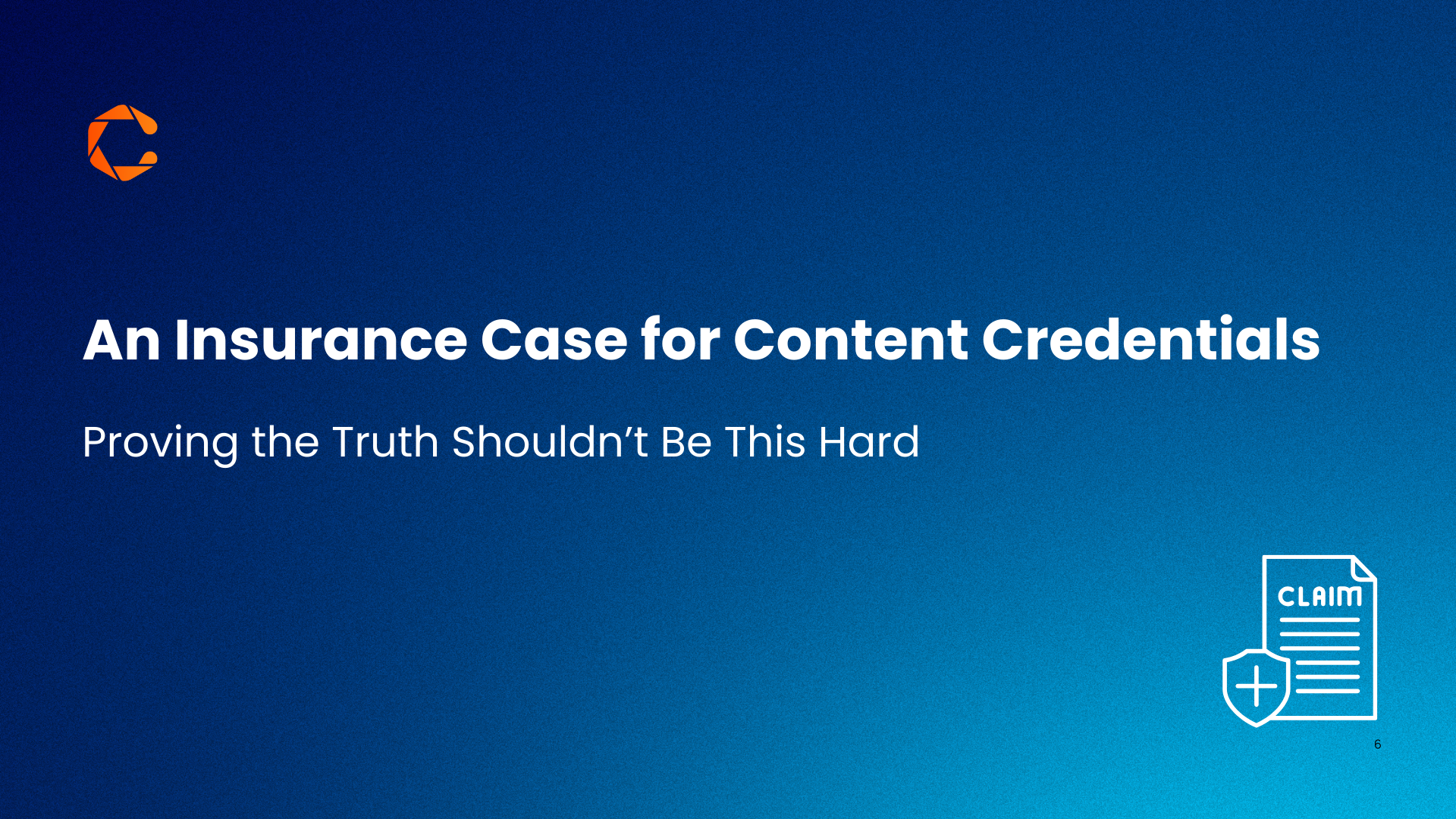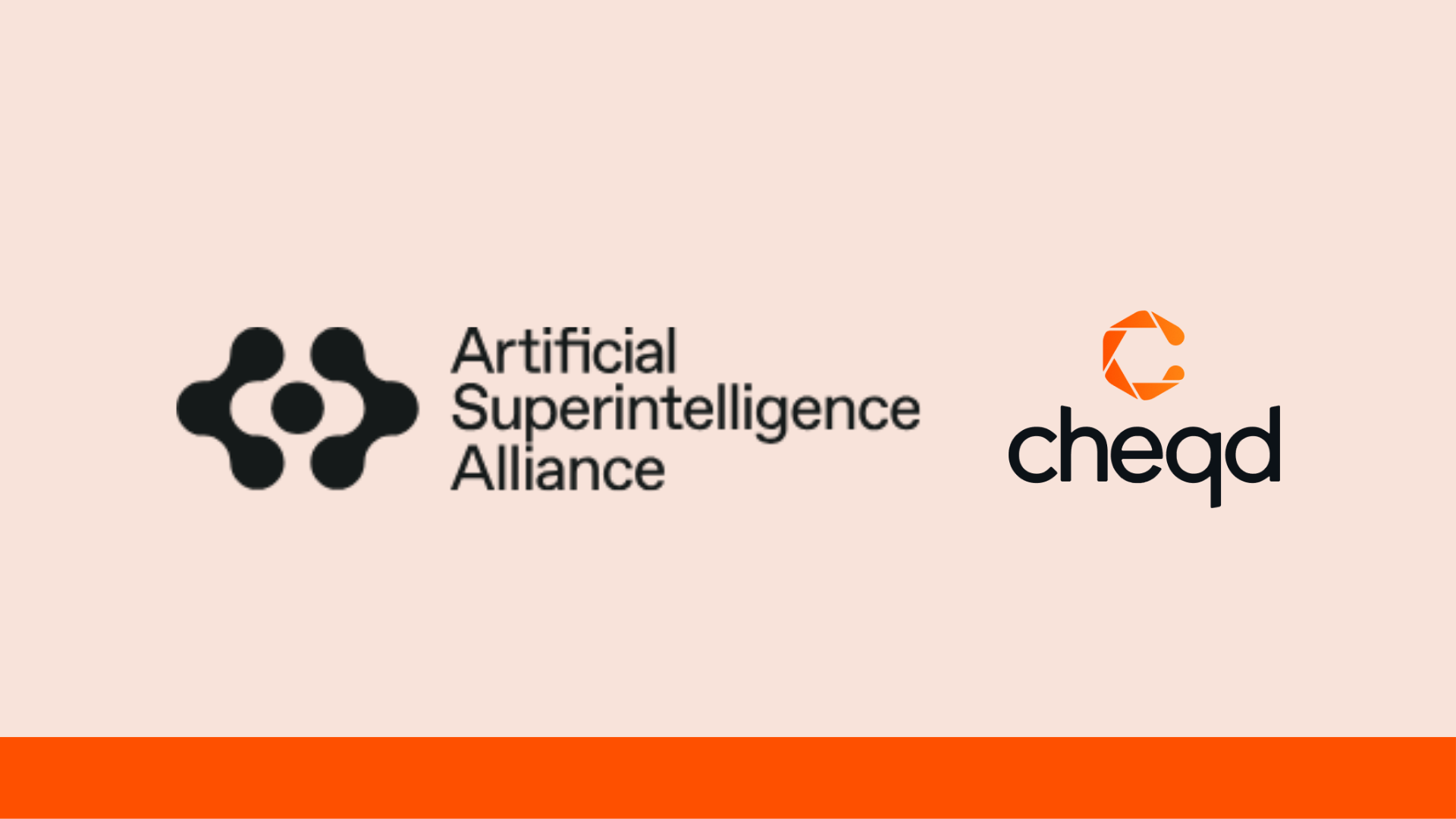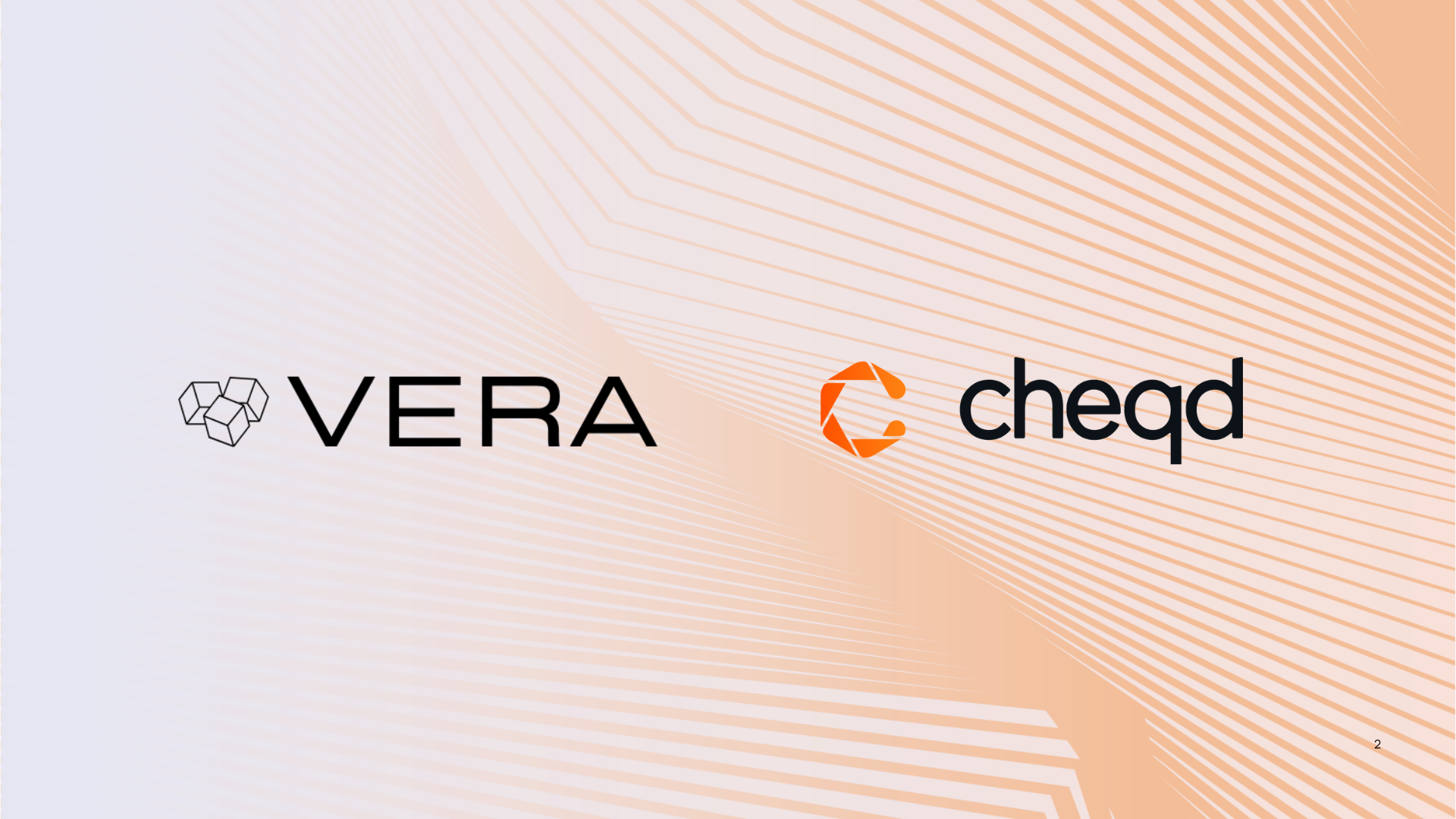Co-authored by Fraser Edwards and Ankur Banerjee
Announcing our 2021 product roadmap for an incentivised decentralised identity network with token-based payment rails.
We started cheqd this year to make digital identity secure, private, commercially sustainable, accessible, and inclusive. We are a small and lean but growing startup of people with deep expertise in identity and decentralised systems.
Our mission is to give people and companies the ability to control their own data and at the same time, enable trusted organisations that add reputation into digital identities to be compensated for the effort they put in for increasing the trustworthiness of data.
We believe the path to achieving this goal is through making self-sovereign identity (SSI) commercially viable through sustainable economic incentives. SSI is an emerging paradigm for exchanging trusted digital data related to people, companies, and things in a much more secure and privacy-preserving fashion that puts empowered control in the hands of data owners.
Today, we are excited to announce that cheqd is building its self-sovereign identity (SSI) network on the Cosmos blockchain framework, joining a community we look forward to working with and contributing to over the coming months and years.
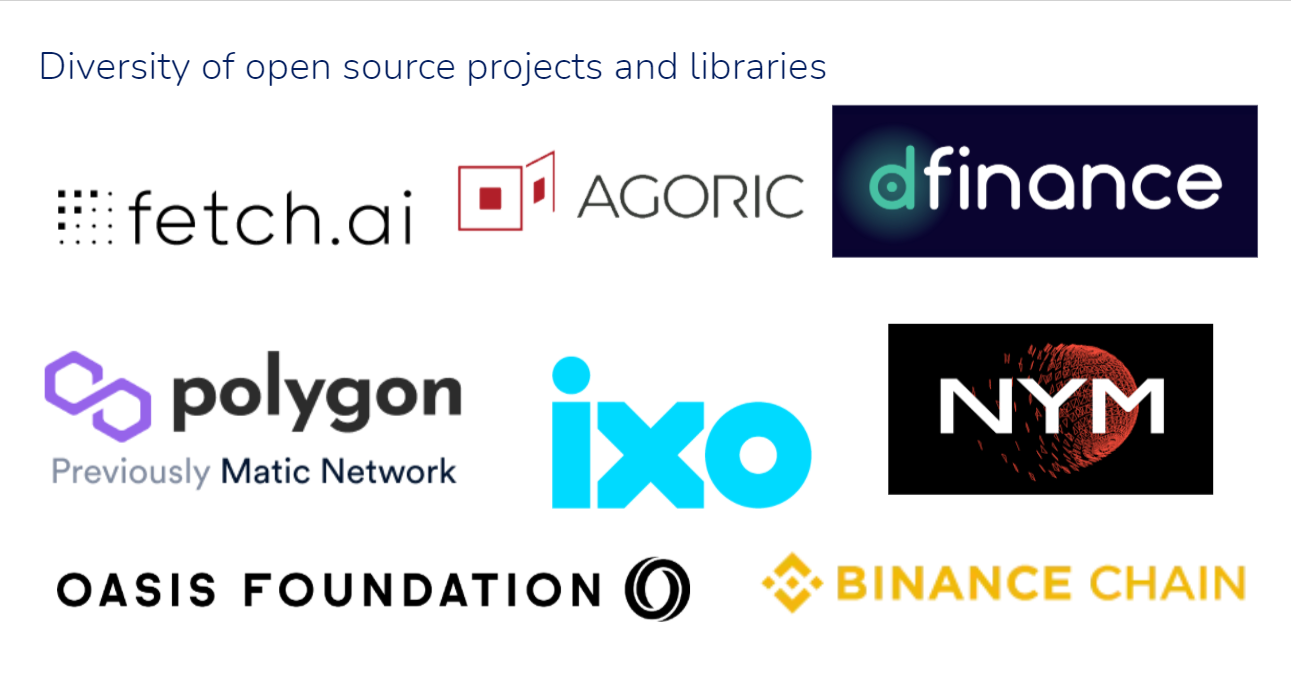
The Cosmos blockchain framework ecosystem has numerous major projects and networks
Since we started in March, we’ve been busy executing on how to make our vision come true. In this blog post, we will explain our product roadmap and why we believe this could be a game-changing shift for the trusted data economy.
Key milestones for cheqd’s product roadmap
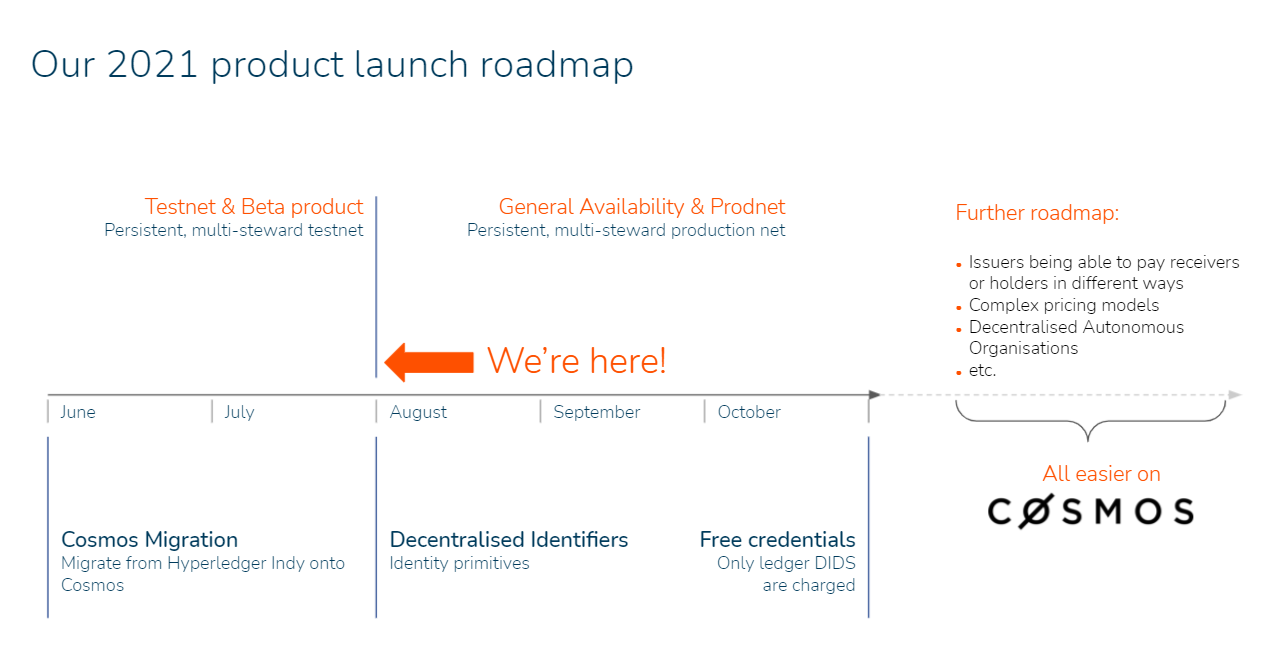
Our product launch roadmap
Our ambition is to hit specific key milestones within the year 2021. We plan on starting with releasing core functionality and then iteratively releasing new product versions that enhance functionality.
- Internal Devnet (we’re here now — June 2021): cheqd is currently running an internal developers-only network of our new Cosmos-based blockchain for build/test purposes.
- Beta product & Testnet (target date — July 2021): Within a month from now, our goal is to have a persistent network accessible to developers to build apps against. We are lucky to have commitments already from 5+ external partners as node operators on the testnet. Big thanks to those partners who want to lead from the front, we’re looking forward to naming and working with you!
We are actively looking to add more partners for our testnet launch, so if you are an SSI vendor, a digital identity company, or an existing node operator for Cosmos validator nodes please reach out to us at [email protected]. - Cosmos-based Decentralised Identifier (DID) method (target date — August 2021): We aim to publish a DID method specification compliant with World Wide Web Consortium (W3C) standards that can be used by the open-source community.
- General availability & Prodnet (target date — October 2021): A production-grade, persistent and public permissionless multi-operator Cosmos-based blockchain network with a token for rewarding incentives. cheqd currently does not have any plans for either a public or private token sale. Our team is hard at work to ensure that the Prodnet launch is carried out in compliance with relevant financial and digital asset regulations in relevant jurisdictions around the world. As such, we want to be transparent that this target date is subject to any relevant regulatory approvals.
- Prodnet+ (target date — late 2021 onwards): Once we have achieved a stable Prodnet release, we will continue working on enhancing our network and product with new functionality that expands the possibilities of what use cases self-sovereign identity applications can support. We have exciting ideas here that we will announce as we make our product delivery timelines more concrete.
We count ourselves lucky to have a team that is experienced in digital identity, blockchain, product innovation, technology delivery, and enterprise deployment. Our team at cheqd will aim to openly and transparently communicate product milestones over the coming months and years.
We thank our partners in this effort so far such as Outlier Ventures and Evernym for their contributions, guidance, and support — as well as our investors and shareholders. We recognise the need to cooperate widely within the digital identity industry and the Cosmos blockchain ecosystem and we aim to do this too.
What products are we building at cheqd
Our core product is an open-source blockchain network with an associated suite of tools that makes exchanging and paying for trusted data easy, inclusive, and secure.
We built this core on blockchain technology, as we believe no single company should be in control of such critical Web infrastructure. For the same reason, we believe it is important to open source the critical parts of our technology and contribute back to the community. Further, we have carried this philosophy into the governance of the network and look forward to sharing details in later blogs.
Our goal when designing this was to build a distributed and decentralised system that is:
- highly-scalable, and able to accommodate large volumes of digital identity interactions and transactions
- flexible, in a way that allows customisation for the needs of different ecosystems based on industry, geography, regulatory frameworks, etc.
- community-driven, such that there is a large and active community of software code and business contributors making improvements
- energy-efficient, compared to proof-of-work blockchains such as Bitcoin or Ethereum, as we believe this efficiency will be crucial for adoption by government organisations and enterprises
Let’s dive deeper into what we are building, following the principles above. cheqd’s initial product suite can be broken down into three parts.
A DECENTRALISED NETWORK FOR SECURE AND PRIVATE TRUSTED DATA EXCHANGE
We are building a Cosmos network blockchain that is standards-compliant with specifications on Decentralised Identifiers (DIDs) and Verifiable Credentials (VCs). In plain language, these are the building blocks that enable private and secure digital identity exchange.
We will not store any personally identifiable information on this blockchain to follow best practices and avoid any of the grey area(s) resulting from GDPR and similar legislation. The blockchain network on Cosmos orchestrated by us will be used to store the identifiers related to trusted organisations, in the same manner, that current decentralised identity networks adopted by governments (such as the EU Self-Sovereign Identity Framework) around the world do.
TOKEN-BASED PAYMENT RAILS FOR DIGITAL IDENTITY INTERACTIONS
Our core hypothesis is that that self-sovereign identity needs commercial models that accelerate its adoption. We want to provide a common and public infrastructure easily accessible to anyone and any organisation that provides B2B and B2B2C payment rails between issuers, holders, and receivers of trusted data.
Effectively, we are building tokens on the Cosmos blockchain framework as a decentralised finance (DeFi) mechanism to pay for digital identity interactions, such as writing Decentralised Identifiers (DIDs), Verifiable Credential (VC) issuance and exchange, checking the revocation status of credentials, etc.
We do not believe in a one-size-fits-all model for how these charging mechanisms and pricing models. cheqd is not and does not plan on dictating a single payment model. Rather, our product vision is to enable each ecosystem to decide this on their own through Layer 1 vs Layer 2 mechanisms and customisable tokenomics.
This public Cosmos blockchain token will reward all parties involved in a trusted data ecosystem: from the individuals the data belong to, the reputable organisations that issue and receive digital credentials, and the blockchain node operators network that provide the infrastructure to carry this out in a decentralised and democratic manner.
We acknowledge that using tokens as a payment rail is not yet widely adopted by large enterprises. We will address this in our roadmap by exploring partnerships with digital asset custodianship providers who can offer legal and technical custodianship of tokens. We hope by doing this we can reduce hurdles for adoption from enterprises and continue working towards making this process frictionless.
EASY-TO-USE SOFTWARE KITS FOR EXTERNAL APP DEVELOPERS TO INTEGRATE INTO THEIR OWN PRODUCTS
Any network is only as valuable and useful as the network effects arising from how many participants utilise that network. Our goal is to make it as easy as possible digital identity app developers currently building on Hyperledger Indy (the prime blockchain framework for SSI) and other DID methods to integrate our solution into their products with minimal disruption.
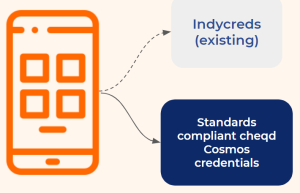
To that end, we are developing mobile client software development kits (SDKs) for iOS and Android. Our aim will be to make these SDKs drop-in replacements for existing Hyperledger Indy client SDKs while maintaining support for Indycreds. It is likely that users of SSI apps will continue the need to maintain access to their existing digital credentials anchored on Indy networks.
What we are more excited about though is that this modularised architecture will also provide app developers APIs for our new Cosmos-based and W3C standards compliant digital credentials. The rich and new functionality offered by our SDK will allow SSI app developers the opportunity to build new services previously not possible.
For the first time, app developers will be able to offer their B2B enterprise customers the capability to implement customisable economic models for how digital credentials issued and consumed are priced (including free!). And as potential node operators on this new incentivised network (although this is not a pre-requisite to using our SDKs in their apps), they could have recurring revenue streams from digital identity interactions.
At cheqd, we believe that for self-sovereign identity to truly be in control of the user, SSI app developers will need to support multiple DID methods — and potentially, future mechanisms of SSI that may not even use DID methods. People are unlikely to want to download multiple SSI apps just because the companies they interact with only support one kind of credential.
Our prediction is that more digital identity app developers will adopt a technology-agnostic approach that allows for plug-and-play integration of multiple DID networks. We strongly believe the capabilities of our public network and infrastructure will offer differentiated features.
We choose to go to the moon… not because they are easy, but because they are hard.
Into the Cosmos and beyond
In the next blog post, we will dive into our decision-making process behind how we settled on the Cosmos blockchain framework so make sure to follow us on Medium. You can also reach out to us on Telegram, Twitter, and LinkedIn for discussions and updates.
We would love to know your thoughts or feedback on our direction using the Cosmos blockchain framework as comments on the article or via any of our other channels, take your pick!
We are also recruiting across a range of different roles. If you find one that you fancy, or want to come work for us, please drop us a line on [email protected].


